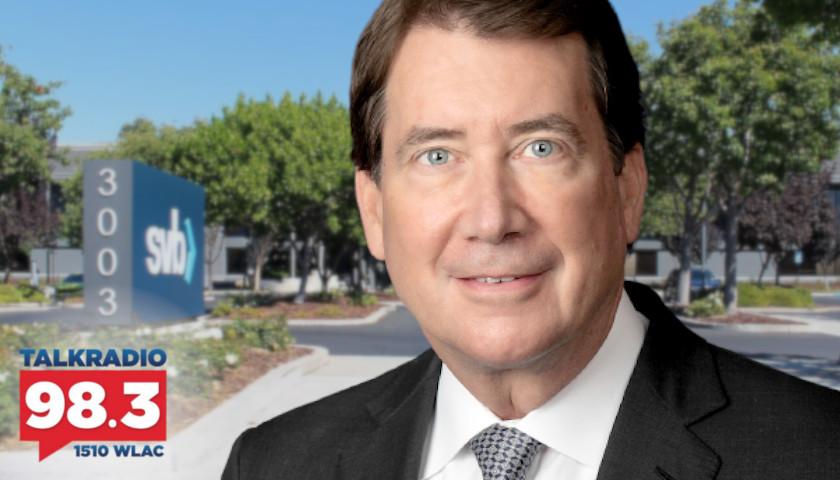Live from Music Row Thursday morning on The Tennessee Star Report with Michael Patrick Leahy – broadcast on Nashville’s Talk Radio 98.3 and 1510 WLAC weekdays from 5:00 a.m. to 8:00 a.m. – host Leahy welcomed Senator Bill Hagerty to the newsmaker line to discuss the series of failures leading up to the Silicon Valley Bank collapse.
Leahy: On the newsmaker line, Senator Bill Hagerty from Tennessee. Good morning, Senator Hagerty.
Hagerty: I’ve gotta say this, though, Michael. We’re about the same age, really in the years. It’s dating us. (Laughter)
Leahy: It’s interesting because as you know, Clint used to work for you when you were with the Haslam administration here in Tennessee. And I told Clint when we took our break, that phone is gonna ring at exactly 6:30 a.m. because Senator Hagerty is the most reliable, punctual person that I’ve ever dealt with. And Clint said, oh yes—and boom, 6:30. Boom. There goes the phone. Welcome!
Hagerty: Clint was a great colleague, and we did some tremendous things. Clint and I both came in to try to help turn the state’s economy around. Clint and I came into that position in January of 2011, Michael, and at that time a lot of people forget this, Tennessee’s unemployment rate was higher than the national average. Our wage growth and GDP growth rates were below the national average, and we came in with a $1.6 billion budget shortfall.
We actually cut our departments. We eliminated over 40 percent of the positions in that department, saved millions of dollars for taxpayers, and we got the state on a roll from an economic standpoint.
Leahy: Congratulations Clint and Senator Hagerty. (Laughs)
Brewer: Most of it is due to Senator Hagerty.
Hagerty: Great teamwork.
Leahy: Speaking of the economy and trouble, the banking system is in trouble, and Silicon Valley Bank failed. To me, it looks like it was because there are a bunch of idiots. Frankly, I saw in the report that they had purchased long-term treasury bills at very low-interest rates. And then when the interest rates went up they had to sell ’em to cover liquidity. I also saw this report. I don’t know if you saw this report. They donated $73 million to Black Lives Matter. Did you see that?
Hagerty: Yes, I did. I did see that. And the person that was responsible for their diversity, equity, and inclusion program, which they bragged about meeting their goals on that front that person was also ostensibly responsible for aspects of their risk management. I wish that person had been focused on the risk management aspect of their job. That’s actually what banking is supposed to be about.
And actually getting the best possible people imaginable into the job and protecting the company, and protecting the well-being of their depositors instead of doing some of this stuff they’re doing. It was a $5 billion green energy fund that they’re out touting. They should have been doing the business of banking.
And as you say, it was just a remarkable set of blunders by the management team. But it goes deeper than that. The San Francisco Fed should have been overseeing this bank. Where were they? Well, we know that the CEO of SVB, Silicon Valley Bank, was sitting on the board of the San Francisco Fed. They were asleep at the wheel not managing this.
It’s just a series of problems that led to the point that on Friday the bank was taken into receivership by the FDIC, but this is where I really have huge heartburn. The FDIC had the weekend to go in and execute an auction to bring in another bank to buy.
I heard rumors. I was on the phone the entirety of the weekend, dealing with these rumors that the FDIC was actually suggesting certain buyers need not apply. That they didn’t want certain types of buyers to take over the bank. They didn’t want the bigger banks to get bigger.
They were very worried about the optics and what the press release would look like. But I did find out this on Monday morning, finally, we got an official briefing from the FDIC. This is after they’d collapsed the thing and after the auction had failed. And I asked the FDIC official, did you have a bidder?
And the answer was, yes, we did. When I asked them why did that bid fail, why did you reject the bid, was it for ideological reasons or was it for substantive reasons? The FDIC official wouldn’t answer my question.
I would think under almost any circumstance, if you had a bid, you would be working with that bid night and day to try to make certain that on Monday morning we had another bank in charge to the extent there was a shortfall in the depositor, you would’ve limited the damage. Just to the Silicon Valley Bank, they would’ve figured that out with FDIC funds.
Instead, they decided to guarantee all depositors in a way that set a precedent. And I think it’s very hard to argue that we’re not guaranteeing every deposit in America, no matter how large it is. Just an incredible failure here.
And they’ve put us now into uncharted waters from a policy standpoint with a blanket guarantee. But I’ve gotta tell you, when the next bank fails, if it were to happen in Tennessee, if they don’t step in and say, we’re gonna guarantee all depositors, what are you gonna say?
Brewer: Senator, it’s Clint. I have a question. It. It seems to me that we have a regulatory structure in place for banking and whenever one of these things happens, they happen every 10 years or so, plus, or minus.
They are people clamoring for more regulation. They don’t want more and more regulation to punish the banks. It seems like we have a regulatory structure in place that really isn’t being followed now and that isn’t dependent upon more legislation.
It’s things like you’ve illuminated with the FDIC, perhaps not doing their job to their full effectiveness. The regional federal reserves, having inherent conflicts of interest in their structure. What do you make of that? Is there more legislation needed? I think I know what the answer is to that.
Hagerty: Clint, you hit the nail on the head. Because the first thing that my colleague Elizabeth Warren did was she, and Bernie Sanders are demanding more legislation and more regulation. This is a typical move by the Biden administration. Joe Biden joined the chorus. This is Donald Trump’s fault. Just like Afghanistan was Donald Trump’s fault.
Just like every failure in their administration is somehow the fault of the previous administration. The rules were in place, completely adequate rules, and the San Francisco Fed was getting the bank’s detailed liquidity data. They could have easily known that there was a big problem here.
In fact, Clint, there were stock analysts on Wall Street as early as last fall complaining about the dangers on Silicon Valley’s balance sheet, and the Fed did nothing about it. They had every tool they needed to do this. They did not step in. Certainly, management wasn’t doing its job.
And then you’ve got the basic process of an FDIC and a set of regulators coming in over a weekend and putting together an auction and selling a bank. They failed miserably at that. So what we have are a series of bureaucratic failures. A series of oversight and execution failures, and they’re trying to run back and say, we need more regulation and more legislation. They had every tool that they needed at their disposal. This is a failure to act.
Listen to today’s show highlights, including this interview:
– – –
Tune in weekdays from 5:00 – 8:00 a.m. to The Tennessee Star Report with Michael Patrick Leahy on Talk Radio 98.3 FM WLAC 1510. Listen online at iHeart Radio.
Background Photo “Silicon Valley Bank” by Coolcaesar. CC BY-SA 4.0.





